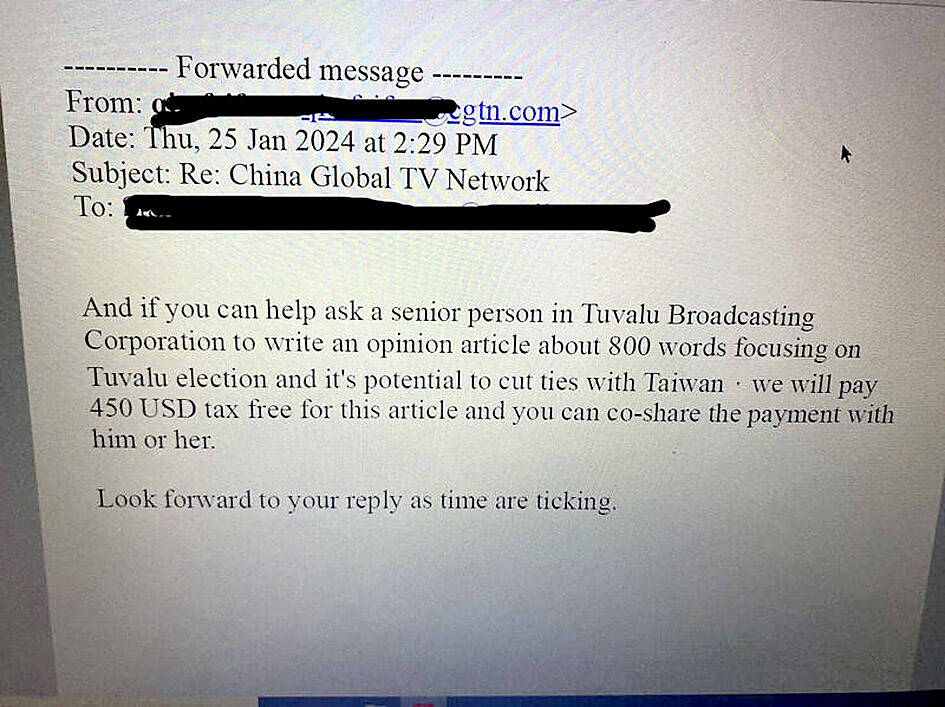Amid specious stories and rumors regarding the possibility that Tuvalu might switch diplomatic recognition from Taiwan to China, reports have emerged that a Chinese state-run broadcaster has asked a news outlet in the Pacific nation to post articles promoting the idea that Funafuti would cut ties with Taipei after its legislative elections last week.
In an e-mail allegedly from China Global Television Network, the sender offered to pay someone at Tuvalu Broadcasting Corp to find a “senior person” at the broadcaster to write an 800-word opinion article “on Tuvalu election and it’s [sic] potential to cut ties with Taiwan.” The e-mail offers to pay the recipient US$450 “tax free,” which they could share with the writer.
The e-mail confirms Taiwanese diplomats’ suspicions that China is paying media to spread misinformation to induce a diplomatic shift away from Taiwan, and to sow distrust in the government and its allies.

Photo: grab from DPP Legislator Wang Ding-yu FB
China has long deployed cognitive warfare tactics aiming to undermine Taiwan’s democracy and sovereignty. However, those efforts have escalated with artificial intelligence technology, and extended beyond domestic issues and cross-strait relations to foreign affairs, to incite skepticism about Washington’s commitment to Taipei and generate tension between Taiwan and its allies to further isolate it from the international community.
The Ministry of Justice Investigation Bureau has said that during the lead-up to the Jan. 13 presidential and legislative elections, the quality and quantity of foreign hostile forces’ information warfare significantly improved, with social media accounts that are much harder to track and “deepfake” videos that are more difficult to spot.
Although Taiwan mostly shrugged off China’s electoral meddling, Larry Diamond, a senior fellow at Stanford University’s Hoover Institution, said afterward that information manipulation would only worsen, and it is not only a problem for Taiwan, but the whole world. He said his research indicates that social media is one of the crucial factors leading to a global democratic recession.
The Investigation Bureau this month inaugurated its Cognitive Warfare Research Center dedicated to studying disinformation threats to Taiwan’s democracy and security. In addition to research, Taiwan needs more ways to prevent, confront and eliminate computer-based cognitive warfare attempts. The government should work more with fact-checking groups to promptly clarify rumors and promote public awareness to repel disinformation. More legislative support and funding are also needed.
A lot of election-related disinformation has been traced to Chinese-based content farms and social media platforms, such Douyin and its international version, TikTok. In addition to communicating with major platforms to remove disinformation, the government should pass legislation on the usage of Chinese apps and social media.
Many democratic countries are considering bans on TikTok. Besides a ban on government use of TikTok and similar platforms, the government could limit usage of them by young people, or within private sectors that are susceptible to information leaking or have higher requirements for information security. However, such restrictions would require convincing the public that their freedom of speech would be protected.
Minister of Foreign Affairs Joseph Wu (吳釗燮) said that Taiwan is documenting its efforts to counter China’s unprecedented interference in the elections, and would publish the findings to help the international community combat disinformation campaigns.
Taiwan also needs to ramp up international collaborations to share know-how and form alliances to combat information manipulation, turning the nation’s experience into a positive contribution to help the world fight against authoritarian powers bent on eroding democratic systems.
The gutting of Voice of America (VOA) and Radio Free Asia (RFA) by US President Donald Trump’s administration poses a serious threat to the global voice of freedom, particularly for those living under authoritarian regimes such as China. The US — hailed as the model of liberal democracy — has the moral responsibility to uphold the values it champions. In undermining these institutions, the US risks diminishing its “soft power,” a pivotal pillar of its global influence. VOA Tibetan and RFA Tibetan played an enormous role in promoting the strong image of the US in and outside Tibet. On VOA Tibetan,
Sung Chien-liang (宋建樑), the leader of the Chinese Nationalist Party’s (KMT) efforts to recall Democratic Progressive Party (DPP) Legislator Lee Kun-cheng (李坤城), caused a national outrage and drew diplomatic condemnation on Tuesday after he arrived at the New Taipei City District Prosecutors’ Office dressed in a Nazi uniform. Sung performed a Nazi salute and carried a copy of Adolf Hitler’s Mein Kampf as he arrived to be questioned over allegations of signature forgery in the recall petition. The KMT’s response to the incident has shown a striking lack of contrition and decency. Rather than apologizing and distancing itself from Sung’s actions,

US President Trump weighed into the state of America’s semiconductor manufacturing when he declared, “They [Taiwan] stole it from us. They took it from us, and I don’t blame them. I give them credit.” At a prior White House event President Trump hosted TSMC chairman C.C. Wei (魏哲家), head of the world’s largest and most advanced chip manufacturer, to announce a commitment to invest US$100 billion in America. The president then shifted his previously critical rhetoric on Taiwan and put off tariffs on its chips. Now we learn that the Trump Administration is conducting a “trade investigation” on semiconductors which
By now, most of Taiwan has heard Taipei Mayor Chiang Wan-an’s (蔣萬安) threats to initiate a vote of no confidence against the Cabinet. His rationale is that the Democratic Progressive Party (DPP)-led government’s investigation into alleged signature forgery in the Chinese Nationalist Party’s (KMT) recall campaign constitutes “political persecution.” I sincerely hope he goes through with it. The opposition currently holds a majority in the Legislative Yuan, so the initiation of a no-confidence motion and its passage should be entirely within reach. If Chiang truly believes that the government is overreaching, abusing its power and targeting political opponents — then